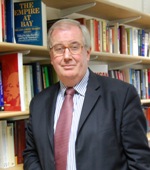Background
Cox was educated at the University of Reading. He has taught at Queen's University Belfast (1972–1995), San Diego State University (1986), the College of William and Mary in Virginia (1987–1989), the University of Wales, Aberystwyth (1995–2001), the Catholic University of Milan (2003 and 2004) and the University of Melbourne (2004). He was also a visiting professor at the Centre for Defence and Strategic Studies in Canberra, Australia, between 2003 and 2004. In 2003, he became a chair at the London School of Economics.
At LSE he helped establish the Cold War Studies Centre in 2004, along with Professor Odd Arne Westad, where they were co-directors and Co-Editors of the London School of Economics CWSC journal, Cold War History . [1] In 2008 the Cold War Studies Centre expanded into LSE IDEAS, a foreign policy centre based which aims to bring the academic and policy words together. In a 2014 international survey, IDEAS was ranked 2nd in the world amongst the best university affiliated Think Tanks.
In 2011, he launched a new Executive Masters in Global Strategy (executive MSc International Strategy and Diplomacy) designed to teach mid-career professionals from the public, private, and NGO sectors who deal with international relations, diplomacy, security, and international business in their working lives. He is the current director of the programme. In addition, since joining the LSE Cox has also acted as academic director of both the LSE-PKU Summer School and of the Executive Summer School.
Work
As a writer, Cox has authored many books on international politics, the Cold War, US foreign policy and the behaviour of superpowers. He has contributed to many academic journals and has been the editor of the Review of International Studies , International Relations and International Politics . He is also the General Editor of Rethinking World Politics, a Palgrave book series. [1] and Routledge's Cold War History.
Professor Cox is a well-known speaker on global affairs and has lectured in the United States, Australia, Asia, and in the EU. He has spoken on a range of contemporary global issues, though most recently he has focused on the role of the United States in the international system, the rise of Asia, and whether or not the world is now in the midst of a major power shift.
This page is based on this
Wikipedia article Text is available under the
CC BY-SA 4.0 license; additional terms may apply.
Images, videos and audio are available under their respective licenses.
